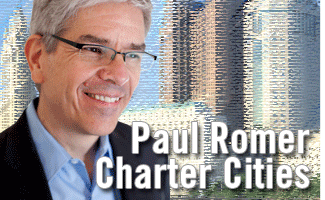
Charter Cities Setback: Who Could Have Imagined?
By Steve Sailer
09/25/2012
The econosphere has been abuzz for several years with NYU professor Paul Romer’s plan to bring the benefit of Good Institutions to Central America by building "charter cities" in the banana republic of Honduras. (Here’s Romer’s 2011 TED talk.) As economist Daron Acemoglu has explained, the only thing that differentiates a rich country from a poor country is that the former has Good Institutions. So, what the Third World needs is for American economists to plan for them private chartered cities with world class Good Institutions. It’s a no-brainer.
Thus, Romer worked out a deal with the government of Honduras to turn state of the art development economics theorizing into reality by building three private cities in Honduras.
What could possibly go wrong? Who could object to such a high-minded, altruistic initiative?
Well, there are always petty carpers everywhere. For example, a Honduran peasants rights lawyer named Antonio Trejo Cabrera disliked Romer’s proposal. The Montreal Gazette reported yesterday:
Trejo had also helped prepare motions declaring unconstitutional a proposal to build three privately run cities with their own police, laws and tax systems.
In Honduras, however, they have time-honored ways of cutting through red tape and nuisance lawsuits:
Antonio Trejo Cabrera, 41, was shot five times while attending a wedding in the capital, Tegucigalpa, the Peasant Movement of the Valley of Bajo Aguan said in a statement.
Trejo was a lawyer from three peasant co-operatives in the Bajo Aguan, a fertile farming area plagued by violent conflicts between agrarian organizations and land owners. More than 60 people have been killed in such disputes over the past two years. The lawyer had recently helped farmers gain legal rights to several plantations … .
Just hours before his murder, Trejo had participated in a televised debate in which he accused congressional leaders of using the private city projects to raise campaign funds.
Meanwhile, Professor Romer has announced (see Marginal Revolution) that he has been frozen out of his oversight role by the government of Honduras, so he’s washing his hands of the whole deal.
An earlier American intellectual who had had big plans for Honduras, the filibuster William Walker, who wanted to add Central American countries to the United States as slave states, died by firing squad in Honduras in 1859. Professor Romer should be glad he’s out of there without enduring the fate of Walker and Trejo.
It almost seems as if land ownership in Central America is very serious stuff. (Remember the Death Squads of the 1980s?) Maybe it’s hard for American theoreticians to figure out what’s really going on in places like Honduras because the truth is only whispered about among locals for fear of ending up like the brave Attorney Trejo.
Perhaps political power does come out of the barrel of a gun.
This fiasco resembles a miniature version of how the Harvard econ department helped provide intellectual air cover for budding oligarchs stealing much of the assets of Russia in the 1990s. Isn’t it about time for economists to do some soul-searching and collective self-criticism?
